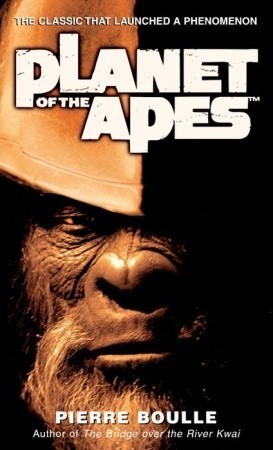About Planet of the Apes
“I am confiding this manuscript to space, not with the intention of saving myself, but to help, perhaps, to avert the appalling scourge that is menacing the human race. Lord have pity on us!”
With these words, Pierre Boulle hurtles the reader onto the Planet of the Apes. In this simian world, civilization is turned upside down: apes are men and men are apes; apes rule and men run wild; apes think, speak, produce, wear clothes, and men are speechless, naked, exhibited at fairs, used for biological research. On the planet of the apes, man, having reached to apotheosis of his genius, has become inert.
To this planet come a journalist and a scientist. The scientist is put into a zoo, the journalist into a laboratory. Only the journalist retains the spiritual strength and creative intelligence to try to save himself, to fight the appalling scourge, to remain a man.
Out of this situation, Pierre Boulle has woven a tale as harrowing, bizarre, and meaningful as any in the brilliant roster of this master storyteller. With his customary wit, irony, and disciplined intellect and style, the author of The Bridge Over the River Kwai tells a swiftly moving story dealing with man’s conflicts, and takes the reader into a suspenseful and strangely fascinating orbit.
- Complete Title: Planet of the Apes
- Format: Paperback
- Language: English
- Number of Pages: 276
- Publication Time: May 30, 2001
- Publisher: Harpercollins Childrens Books
- ISBN: 0345447980
- ISBN13: 9780345447982
About Pierre Boulle
 Pierre Boulle
Pierre Boulle
Librarian Note: There is more than one author in the Goodreads database with this name.
Pierre Boulle (20 February 1912 – 30 January 1994) was a French novelist best known for two works, The Bridge over the River Kwai (1952) and Planet of the Apes (1963) that were both made into award-winning films.
Boulle was an engineer serving as a secret agent with the Free French in Singapore, when he was captured and subjected to two years’ forced labour. He used these experiences in The Bridge over the River Kwai, about the notorious Death Railway, which became an international bestseller. The film by David Lean won many Oscars, and Boulle was credited with writing the screenplay, because its two genuine authors had been blacklisted.
His science-fiction novel Planet of the Apes, where intelligent apes gain mastery over humans, was adapted into a series of five award-winning films that spawned magazine versions and popular themed toys.
Reviews Planet of the Apes
 zuza_zaksiazkowane
zuza_zaksiazkowane
3.5…
 Nicole
Nicole
No uwielbiam tę książkę…
 Lyn
Lyn
I think Pierre Boulle’s novel Planet of the Apes is a social fantasy, an allegory for revealing our civilization as blindly mimicking our past, as “aping” the good and bad of what has come befor…
 Nataliya
Nataliya
I remember being seven or so and seeing the last scene of Planet of the Apes film (the old one with Charlton Heston) on my grandma’s TV. It blew my barely formed mind. Jaw dropping, speechless, all…
 Nika
Nika
When you hear Planet of the Apes, the first thing that probably comes to mind is the movie trilogy with the evolved chimp Caesar as a protagonist.Forget about that movie. The book by Pierre Boule, fir…
 Henry Avila
Henry Avila
When a film becomes so immensely popular they achieve pop culture status, such as The Planet of the Apes, (1968’s version with Charlton Heston of course) and the many different reincarnations that fol…
 Luca Ambrosino
Luca Ambrosino
ENGLISH (Planet of the Apes) / ITALIANO«Jinn and Phyllis were spending a wonderful holiday in space, as far away as possible from the inhabited stars» A couple of tourists on an interplanetary trip…
 Bradley
Bradley
Re-Read 6/3/23:My Buddy reader surprised me by finding and wanting to read this (for free, now) on Audible, and I thought it sounded great. So here I am, enjoying this very excellent skewering of all…
 Brett C
Brett C
I enjoyed this story. I can say both the book and the movie are great in their own way. The movie was science fiction but the book seemed more socially-based lo-fi science fiction. The book goes way m…
